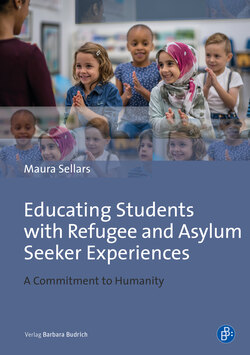Читать книгу Educating Students with Refugee and Asylum Seeker Experiences - Maura Sellars - Страница 6
На сайте Литреса книга снята с продажи.
[vii] Foreword
ОглавлениеJohn Fischetti
There are 68.5 million forcibly displaced people in the world.
40 million of our fellow Earthlings are internally displaced, 25.4 million more are refugees and 3.1 million are asylum seekers. (https://www.unhcr.org/figures-at-a-glance.html)
The number of refugees is the same population as the whole of Australia or the whole city of Shanghai. The diaspora facing the planet is shocking, made worse by war, famine, disease and political environments that marginalize the most vulnerable.
In this book Maura takes on these issues straight away: Chapter 1: Many students are disadvantaged by the impact of neoliberal policies and purposes on education, but it may be students with refugee experiences who have the greatest need for educational experiences which exemplify pedagogical love and care and respect what it is to be human. The task of teachers and others who would engage in this teaching with love and care is made increasingly difficult by the standardization and quantification of their work. Accompanied by the stresses and pressures of the need to continually improve their productivity and demonstrate their efficiency, the notion of teaching as an act of love and caring may appear to many to be almost impossible. However, the negligence of authentic scholarship and the proliferation of values that erode society, community and sense of self to profit the privileged few may easily be considered as immoral acts against humanity.
And, again in Chapter 8: Education in these contexts has looked backwards, not forwards, and, as such, is totally unprepared for the impact of authentic multiculturalism in which traditional and modern, diverse ways of knowing and doing are honoured and respected as legitimate epistemologies. It steadfastly ignores philosophies and knowledge which bring hope to the urgent task of educating students to cope with inevitable tensions of a ‘multi- perspectival world’ characterised by change, ‘contradiction, [viii] chaos and complexity ‘ (Gidley, 2016 p. 112), which, while important all students, is urgent and critical for students with refugee and asylum seeker experiences whose ontologies already mirror the change ‘contradiction, chaos and complexity’ of ‘the multi -perspectival world’ of which Gidley writes and which reflects the ‘Postformal world’ of Sardar (2010).
Although the following story is a bit of an urban legend, it may make a connection as to how to frame the education opportunity for students with refugee and asylum seeker experiences in Westernized status quo school systems. During the early days of personal computers most companies incorporated memory chips that were made in Japan. An American computer company issued a request in their contract for a large order of memory chips that asked the company to ensure for quality control of 90%--that is that 90% of the chips would work. The company that filled the request was confused by that stipulation and sent two boxes of chips to the US to complete the order. One box contained 100% working chips and a second box of 10% of the first order contained defective chips. The computer chip manufacturer’s assumption was that they would always achieve 99.99% effectiveness in all of its products, not assume a predetermined number that just wouldn’t work. Their only solution to satisfy the order was to deliberately ship defective chips separate from the ones that worked. Most Western schools operate on a philosophy of education that assists some of their students some of the time. For those vulnerable learners, this predetermined failure rate places anyone of difference, particularly learners with refugee and asylum seeker experiences, most at risk. The system assumes first language mastery, active parent engagement, access to resources to support learning and cultural capacity to know such things as holiday customs and certain “basics” only known to people from the region. Add to that the post traumatic nature of the refugee experience, particularly those from awful wars and famine, it is no wonder that Maura proposes a whole new vision for refugee education. It is a compelling history and call to action. It is important work for all of us in education. And given the world’s current strife, will only be more important from here.
Professor John Fischetti
Pro Vice Chancellor
Faculty of Education and Arts
University of Newcastle, Australia
John is a global expert in school transformation, teacher education, and leadership for learning for all.
